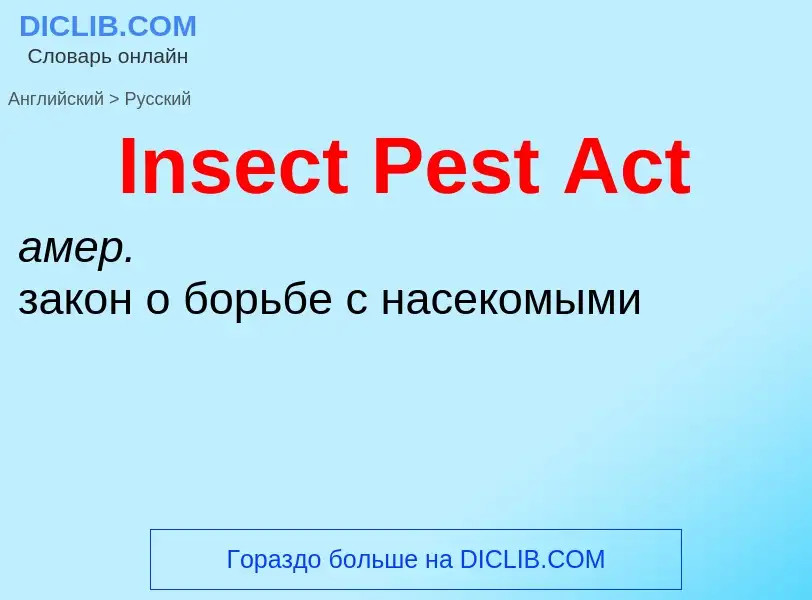(Insecta), самый крупный класс животных, объединяющий больше видов, чем все прочие группы вместе взятые. Относится к членистоногим беспозвоночным. Как и у всех этих животных, у насекомых сегментированное тело с членистыми придатками, покрытое более или менее твердым наружным скелетом, в состав которого входит сложный полисахарид хитин. Другие важнейшие классы членистоногих - Crustacea (ракообразные, т.е. раки, крабы, креветки, лангусты, дафнии и т.п.), Arachnida, или Arachnoidea (паукообразные, т.е. пауки, сенокосцы, скорпионы, клещи и др.), Chilopoda (губоногие многоножки) и Diplopoda (двупарноногие многоножки). Характерные признаки насекомых - сравнительно мелкие размеры, три пары ног (отсюда их второе название - Hexapoda, т.е. шестиногие) и две пары крыльев (у ряда форм одна или обе отсутствуют). Вероятно, видов насекомых несколько миллионов, хотя описано пока примерно 900 000, причем некоторые - по единственному экземпляру. С другой стороны, численность отдельных видов достигает многих миллиардов особей, и они могут приносить огромный вред растительности и сильно досаждать животным, включая человека. Ряд форм, например среди бабочек, стрекоз и жуков, относится к красивейшим творениям природы.
Насекомые питаются почти всеми живыми существами и продуктами их жизнедеятельности и сами служат основным кормом многих животных и даже некоторых растений. Исключительно насекомыми питаются некоторые рыбы и птицы. Т.н. насекомоядные, или плотоядные растения, например росянки и венерина мухоловка, обладают специальными структурами, позволяющими ловить и переваривать насекомых. Однако для регулирования их численности гораздо важнее то, что многие их виды паразитируют на других или на разных стадиях жизненного цикла выступают в роли хищников, истребляющих других насекомых. Хотя немало насекомых принято считать вредителями, подавляющее большинство их приносит человеку пользу, например опыляя растения и способствуя образованию плодов и семян.
Насекомые адаптировались почти ко всем средам обитания. Наиболее обильны они в тропиках и областях с теплым умеренным климатом, однако некоторые виды постоянно обитают даже в Антарктике. Большинство видов наземные, но известны и формы, плавающие на поверхности океана или ведущие земноводный образ жизни на его берегах. Насекомые встречаются в реках и озерах, в самых сухих пустынях и глубоких пещерах. Некоторые виды регулярно совершают длинные перелеты, тогда как у других особи проводят почти всю или всю жизнь внутри маленькой норки, одного плода или даже семечка.
См. также:

.jpg?width=200)

![[[Boll Weevil Monument]], erected by the citizens of [[Enterprise, Alabama]] to honour the pest that ended their dependence on cotton, a poverty crop [[Boll Weevil Monument]], erected by the citizens of [[Enterprise, Alabama]] to honour the pest that ended their dependence on cotton, a poverty crop](https://commons.wikimedia.org/wiki/Special:FilePath/Boll weevil monument.jpg?width=200)
![John Curtis]]'s ''Farm Insects'', 1860 John Curtis]]'s ''Farm Insects'', 1860](https://commons.wikimedia.org/wiki/Special:FilePath/Curtis potato pests.jpg?width=200)
 pollinating Avocado cv.jpg?width=200)

![Mosquito ''([[Aedes aegypti]])'' biting a human Mosquito ''([[Aedes aegypti]])'' biting a human](https://commons.wikimedia.org/wiki/Special:FilePath/Aedes aegypti biting human.jpg?width=200)
![[[Biological pest control]]: [[parasitoid wasp]] (''[[Cotesia congregata]])'' adult with pupal cocoons on its host, a tobacco hornworm ''[[Manduca sexta]]'' (green background) [[Biological pest control]]: [[parasitoid wasp]] (''[[Cotesia congregata]])'' adult with pupal cocoons on its host, a tobacco hornworm ''[[Manduca sexta]]'' (green background)](https://commons.wikimedia.org/wiki/Special:FilePath/Cotesia9061.8.15.07.c.jpg?width=200)
![Dog control van, [[Rekong Peo]], [[Himachal Pradesh]], India Dog control van, [[Rekong Peo]], [[Himachal Pradesh]], India](https://commons.wikimedia.org/wiki/Special:FilePath/Dog van Rekong Peo.jpg?width=200)
![Cultivation by [[ploughing]] exposes insect pests to predators such as [[black-headed gull]]s. Cultivation by [[ploughing]] exposes insect pests to predators such as [[black-headed gull]]s.](https://commons.wikimedia.org/wiki/Special:FilePath/Following the plough 3 - geograph.org.uk - 1019422.jpg?width=200)
![Spraying [[pine]] logs with [[insecticide]] against ''[[Ips sexdentatus]]'', a pine engraver beetle Spraying [[pine]] logs with [[insecticide]] against ''[[Ips sexdentatus]]'', a pine engraver beetle](https://commons.wikimedia.org/wiki/Special:FilePath/Insecticide pine logs ips sexdentatus.jpg?width=200)
![[[Jet engine]] fan blades damaged by [[bird strike]] [[Jet engine]] fan blades damaged by [[bird strike]]](https://commons.wikimedia.org/wiki/Special:FilePath/JT8D Engine after Bird Strike.jpg?width=200)
![Larva, pupa and adult clothes moth ''[[Tineola bisselliella]]'' with characteristic damage to fabric Larva, pupa and adult clothes moth ''[[Tineola bisselliella]]'' with characteristic damage to fabric](https://commons.wikimedia.org/wiki/Special:FilePath/MiteTineola 1233096.jpg?width=200)
![A contemporary wood engraving of varmint hunters shooting [[passenger pigeon]]s, a varmint species that was known to damage crops. [[Overhunting]] resulted in complete extinction of the species. A contemporary wood engraving of varmint hunters shooting [[passenger pigeon]]s, a varmint species that was known to damage crops. [[Overhunting]] resulted in complete extinction of the species.](https://commons.wikimedia.org/wiki/Special:FilePath/Passenger pigeon shoot.jpg?width=200)
![[[Brown rat]] infestation [[Brown rat]] infestation](https://commons.wikimedia.org/wiki/Special:FilePath/Rat pest control underground.png?width=200)
![snail]], have been used to control pests in China, Southeast Asia, and Africa for many centuries. snail]], have been used to control pests in China, Southeast Asia, and Africa for many centuries.](https://commons.wikimedia.org/wiki/Special:FilePath/Red weaver ants (Oecophylla smaragdina) feeding on a dead African giant snail (Achatina fulica) - journal.pone.0060797.g001-F.png?width=200)
![Rodent bait station, [[Chennai]], India Rodent bait station, [[Chennai]], India](https://commons.wikimedia.org/wiki/Special:FilePath/Rodent Bait Station, Chennai, India.jpg?width=200)

![Tent [[fumigation]] of a house in America Tent [[fumigation]] of a house in America](https://commons.wikimedia.org/wiki/Special:FilePath/Tent fumigation.jpg?width=200)
![The red flour beetle, ''[[Tribolium castaneum]]'', attacks stored grain products worldwide. The red flour beetle, ''[[Tribolium castaneum]]'', attacks stored grain products worldwide.](https://commons.wikimedia.org/wiki/Special:FilePath/Tribolium castaneum.jpg?width=200)
